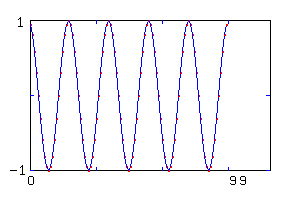conv(1:3, 4:8)
4 13 28 34 40 37 24
x = 3:4;
z = 1:5;
y = conv(cos(conv(x, 2*z)), x)
2.880510859951098 5.06492733204164 -0.9133825771002477 -5.3147141175460195 -0.5400558709060403 0.6932144643375593 -2.6677522466090475
x = 4:5;
y = 8 - conv(x, 1:3)
-4 -5 -14 -7
params( (3) )
params( [3] )
3
3
d0 = (1-sqrt(3))/(4*sqrt(2));
d1 = -(3-sqrt(3))/(4*sqrt(2));
d2 = (3+sqrt(3))/(4*sqrt(2));
d3 = -(1+sqrt(3))/(4*sqrt(2));
wavelet = [d0, d1, d2, d3];
disp(wavelet)
-0.12940952255126034 -0.2241438680420134 0.8365163037378077 -0.4829629131445341
sum([ 9, 5, 3, 1 ])
18
myvar = 0.125 + 6.7
(3-4)*12/((-5+1+2*3)-(103-160+myvar))
myvar = (3-4)*12/((-5+1+2*3)-(103-160+6/8));
myvar
6.825
-0.22999520843315766
myvar
(double) -0.20600858369098712
z = 4 + 3 + 1
if (z==8)
disp(z);
end
8
8
num = 0;
for i=4:6
for j = 7:10
for k = 2:3
num = num + k;
end
end
end
num
num
(double) 60
num2 = 0;
i = 6;
while i > 3
j = 7;
while j < 11
k = 2;
while k <= 3
num2 = num2 + k;
k = k + 1;
end
j = j + 1;
end
i = i - 1;
end
num2
num2
(double) 60
for x = 1:4
if (x==2)
disp('the if is true');
else
if (x==3)
disp('the elseif is true');
else
disp('went to the 2nd else block')
end
end
end
went to the 2nd else block
the if is true
the elseif is true
went to the 2nd else block
for x = 0:4
if (x==2)
disp('two');
elseif (x==3)
disp('three');
elseif (x==1)
disp('one');
else
disp('x is not 1 2 or 3.');
end
end
x is not 1 2 or 3.
one
two
three
x is not 1 2 or 3.
mylist = [ 9, 5, 3, 1 ];
sum(mylist) / length(mylist)
4.5
a = 4
disp(a:10-1)
4
4 5 6 7 8 9
mylist = [ 9, 5, 3, 1, 2, 8, 4, 2, 6];
a = 2;
mylist(a:length(mylist)-1)
5 3 1 2 8 4 2
disp('hello');
ls
disp('there');
(Results vary, but should look like this:)
hello
there
total 52K
-rw-r--r-- 1 mweeks 75 Jan 5 22:16 cosplot
-rw-r--r-- 1 mweeks 254 Jan 7 13:12 elseif.ex
-rw-r--r-- 1 mweeks 460 Jan 1 12:24 ex1
mylist = [ 9, 5, 3, 1, 2, 8, 4, 2, 6];
swap = 1;
while (swap==1)
swap = 0;
% go through the list, swapping if out of order
for index=1:length(mylist)-1
if (mylist(index) > mylist(index+1))
% swap the order of these two
y = mylist(index);
swap = 1;
mylist(index) = mylist(index+1);
mylist(index+1) = y;
end
end
end
% show the sorted array
disp(mylist)
1 2 2 3 4 5 6 8 9
t = 0:99;
x = cos(2*pi*5*t/100);
plot(x)
This should look like:

a = 4;
disp('hello ' + a);
disp(a + ' hello');
This should produce the following output:
hello 4
4 hello
a3 = 3*j
b = 1-a3
This should produce the following output:
0 + 3i
1 - 3i